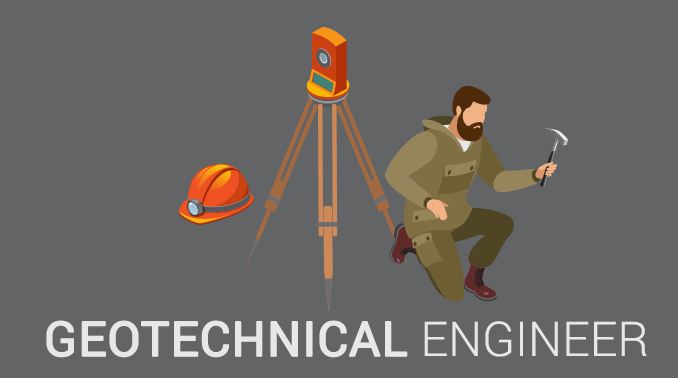Geotheta Fundamentals Explained
Geotheta Fundamentals Explained
Blog Article
The Facts About Geotheta Uncovered
Table of ContentsGeotheta Fundamentals ExplainedThe Main Principles Of Geotheta Geotheta Can Be Fun For EveryoneLittle Known Questions About Geotheta.Geotheta for Beginners

They carry out website investigations, accumulate examples, execute lab tests, and examine data to evaluate the suitability of the ground for building jobs - Geotechnical Engineers. Based upon their findings, geotechnical designers give recommendations for structure style, slope security, preserving structures, and mitigation of geotechnical threats. They team up with other experts, such as engineers, structural designers, and construction teams, to make certain that geotechnical factors to consider are integrated into the total project layout and application
By analyzing the behavior and buildings of soil and rock, they can recognize prospective geotechnical hazards such as landslides, dirt negotiation, or incline instability. Their competence assists protect against failings or mishaps that can endanger lives and property. Here are some detailed tasks and duties of a geotechnical engineer: Website Examination: Geotechnical engineers conduct site examinations to gather data on subsurface problems.
They analyze the information to recognize the residential properties and habits of the soil and rock, including their toughness, leaks in the structure, compaction qualities, and groundwater conditions. Geotechnical Evaluation and Design: Geotechnical engineers examine the information collected throughout website investigations to assess the stability and suitability of the website for building and construction jobs. They do geotechnical estimations and modeling to review variables such as bearing capability, settlement, slope stability, lateral earth pressures, and groundwater flow.
The 45-Second Trick For Geotheta
Structure Layout: Geotechnical designers play an important function in making foundations that can safely support the designated structure. They assess the soil conditions and tons demands to identify the ideal structure type, such as shallow structures (e.g., grounds), deep structures (e.g (https://www.gaiaonline.com/profiles/geotheta/46779300/)., heaps), or specialized techniques like dirt improvement. They take into consideration aspects such as negotiation limitations, bearing ability, and soil-structure communication to establish optimal foundation designs
They examine building and construction plans, screen site activities, and carry out area evaluations to confirm that the design referrals are followed. If unpredicted geotechnical issues arise, they evaluate the circumstance and give referrals for remediation or modifications to the style. Danger Analysis and Mitigation: Geotechnical engineers analyze geotechnical risks and risks related to the task website, such as landslides, liquefaction, or soil erosion.

Cooperation and Interaction: Geotechnical engineers work very closely with various other experts associated with a job, such as engineers, architectural engineers, and building and construction groups. Reliable interaction and partnership are vital to integrate geotechnical considerations right into the overall task design and building and construction procedure. Geotechnical designers offer technological knowledge, solution queries, and make sure that geotechnical needs are fulfilled.
Indicators on Geotheta You Should Know
Below are some sorts of geotechnical engineers: Foundation Designer: Structure engineers focus on creating and evaluating foundations for structures. They examine the dirt problems, tons needs, and site attributes to identify one of the most ideal foundation type and design, such as shallow structures, deep structures, or specialized strategies like heap structures.
They review the aspects affecting incline stability, such as dirt properties, groundwater conditions, and slope geometry, and create strategies to avoid slope failures and reduce risks. Earthquake Engineer: Quake engineers concentrate on analyzing and developing frameworks to hold up against seismic pressures. They evaluate the seismic risk of a site, assess soil liquefaction potential, and develop seismic design requirements to make certain the safety and strength of structures during earthquakes.
They do area screening, gather examples, and analyze the accumulated information to characterize the soil residential properties, geologic formations, and groundwater conditions at a site. Geotechnical Instrumentation Designer: Geotechnical instrumentation designers focus on monitoring and measuring the actions of soil, rock, and frameworks. They install and maintain instrumentation systems that keep an eye on aspects such as soil settlement, groundwater levels, slope movements, and architectural variations to assess performance and offer early warnings of prospective issues.
Little Known Questions About Geotheta.
They carry out examinations such as triaxial examinations, consolidation tests, direct shear examinations, and leaks in Recommended Reading the structure examinations to collect information for geotechnical analysis and layout. Geosynthetics Engineer: Geosynthetics designers focus on the design and application of geosynthetic materials, such as geotextiles, geogrids, and geomembranes. They use these materials to enhance dirt security, enhance slopes, supply drainage remedies, and control erosion.
They often tend to be investigatory individuals, which indicates they're intellectual, introspective, and analytical. They are curious, systematic, sensible, analytical, and sensible. Some of them are likewise social, meaning they're kind, generous, cooperative, individual, caring, useful, compassionate, tactful, and friendly - Geo Tech Engineer.
In the workplace setting, geotechnical engineers use specialized software application tools to do computations, create designs, and evaluate information. They prepare reports, review project specifications, communicate with clients and employee, and coordinate task activities. The office setup offers a favorable environment for study, evaluation, and partnership with other professionals entailed in the task.
The Best Guide To Geotheta
They regularly see job sites to perform site investigations, examine geotechnical conditions, and collect data for analysis. These check outs involve traveling to different areas, in some cases in remote or difficult surfaces. Geotechnical designers may perform soil tasting, conduct tests, and display building tasks to ensure that the geotechnical elements of the task are being applied appropriately.
Geotechnical designers additionally work in specialized geotechnical labs. Geotechnical lab designers work thoroughly in these environments, handling testing equipment, running tools, and recording data.
Report this page